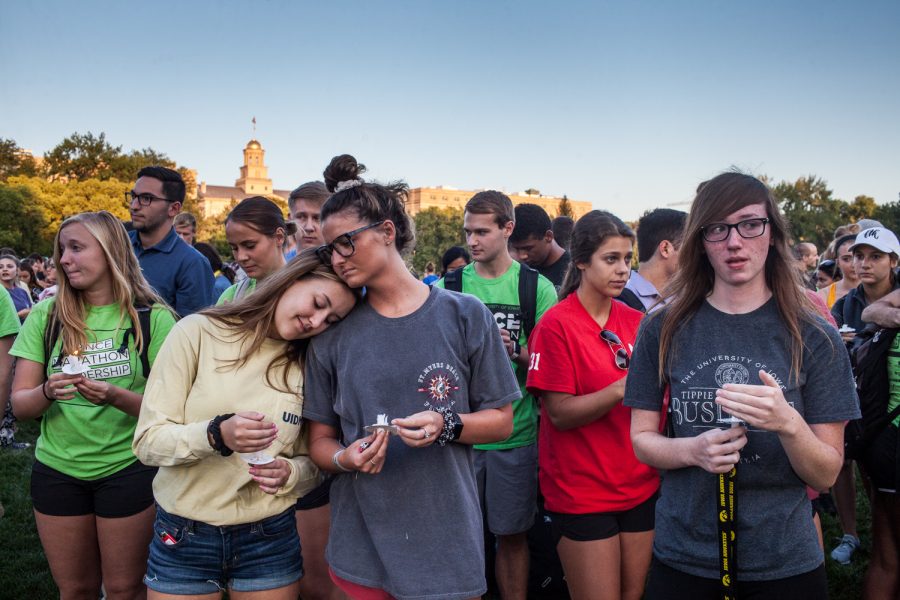Banerjee: Canceling classes is important for grieving students
In light of increased campus violence and grieving students, it is necessary to change how schools react.
Community members gather to pay their respects during a vigil in memory of UI student Mollie Tibbetts at Hubbard Park on Wednesday, Aug. 22, 2018. Tibbetts went missing on July 18, in Brooklyn, Iowa.
November 4, 2018
Violence on school campuses across the country has dramatically increased, according to a study by the Educator’s School Safety Network, a national non-profit school safety organization. In Iowa, we have seen this firsthand. Over the past few months, we have watched as tragedies swept Iowa campuses and surrounding areas, including the deaths of University of Iowa student Mollie Tibbetts and Iowa State University student Celia Barquin Arozamena.
Recently, violence hit the University of Utah, as well, with the death of track and field runner Lauren McCluskey, who was found outside student housing. When the university canceled classes following the violence, a disparity stood out in relation to state universities.
While there is no clear set of instructions following campus violence, many have called attention to how neither the University of Iowa nor Iowa State canceled classes in reaction to student deaths. This led to some discomfort among the student base, who questioned why they were not allowed what they saw as an appropriate time to grieve. While it occurred off-campus, Arozamena’s slaying happened during the school year while classes were in session.
Navigating campus life after a tragedy is a difficult road. It is not easy to find the perfect solution for handling the emotional fallout that will satisfy and aid everyone involved. It’s even more difficult to ascertain what counts for a tragedy “worthy” of having classes canceled: is it distance from campus? Whether or not it occurred during the school year?
RELATED: UI hosts panel discussing anti-Semitism in wake of Pittsburgh shooting
In these cases, the student reaction differs as well: many see no reason to attend class in the face of grief while others find going to classes and maintaining order to be the best way to handle their emotions.
Following stress like this, it’s impossible to attribute blame to a university for its handling of a crisis, but going forward, and especially in a world with heightened on-campus violence, it seems like we must implement better strategies. Perhaps canceling classes isn’t the perfect solution, but at the very least, implementing looser attendance policies following tragedy feels like a natural response in many ways. It allows students and faculty time to grieve on their own terms; rather than feeling guilty for not being up to going to class, it gives them the appropriate time to seek the help they need.
RELATED: Transformative Healing partners with RVAP to support survivors
Not allowing people to grieve properly can be a harmful situation, engendering more uneasiness. Canceling classes, or establishing looser attendance policies, may not be a fool-proof manner of assuring this can happen, but it could help to ease anxieties regarding the situation as well as provide the time and place to grieve.
Arguments against it include the difficulty of rescheduling academic semesters around missed days, but when a school-wide tragedy occurs, not doing anything can feel like a lack of care or interest. On-campus violence has been growing and it’s important to ensure that it doesn’t become normalized. Continuing everyday academic life makes each death feel “regular.” It becomes just another facet of life that we must overcome. With the frequency of school shootings and other crimes, this mentality can be dangerous.
To avoid allowing violence to become normalized, the least universities can do is to ensure these situations are treated with the respect and dignity they deserve, and if canceling classes and inconveniencing some people is the cost, it’s worth it.






